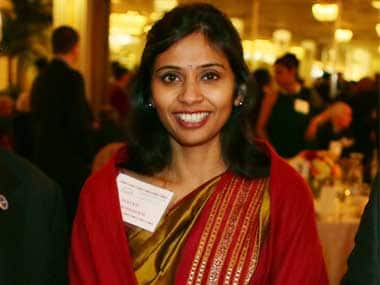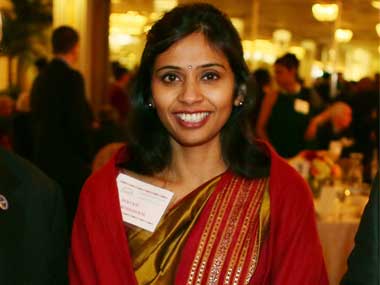The ongoing India-US diplomatic spat over the Devyani Khobragade incident has just traversed to next stage, indicating a long haul ahead. The fifth India-US Energy Dialogue, scheduled to be held in New Delhi on 15-16 January, has now been postponed at India’s instance. Fresh dates of this important institutionalised mechanism between India and the United States would be announced later. US Energy Secretary Ernest Moniz was to travel to India next week for this event but India has formally conveyed to the Americans that it is not ready to host Moniz and hold the event at this point of time. This should be seen as India’s last ditch effort to push the envelope ahead of the scheduled indictment of Khobragade in a New York court on 13 January. The Americans wanted Indians to carry on with the bilateral processes and not let the Devyani Khobragade incident derail the bilateral ties. But by indefinitely postponing the Energy Dialogue New Delhi has firmly conveyed to Washington that it won’t be business as usual till the Devyani row is resolved amicably and her dignity is restored.[caption id=“attachment_1332221” align=“alignleft” width=“380”]
 Indian diplomat Devyani Khobragade. AP[/caption] External Affairs Minister Salman Khurshid has pledged before Parliament that he won’t return “to this house” (Rajya Sabha) till India fully restores the dignity of Devyani Khobragade. India’s move of postponing the Energy Dialogue is to be seen as a deliberate and conscious decision to up its ante and convey to Washington in no uncertain terms that the Indians are not taking it as a case of visa fraud against an individual diplomat but as a matter of national honour where the whole of India is on the same page. India has already fobbed off the US State Department’s efforts to send to New Delhi its newly sworn in assistant secretary in-charge of South and Central Asia Nisha Desai Biswal, a woman of Indian origin. The State Department was bluntly told by the Indians that Biswal won’t be welcome. The indefinite postponement of the Indo-US Energy Dialogue is the most severe setback to bilateral ties between the two countries. The last edition of the event, the 4th India-US Energy Dialogue, was held in New Delhi on 24 June 2012. The event was launched on 31 May 2005 with five Working Groups along with a Steering Committee to provide oversight. The goals of the Indo-US Energy Dialogue are to promote increased trade and investment in the energy sector by working with the public and private sectors to further identify areas of cooperation and collaboration. Building upon the broad range of existing cooperation, it is hoped that this effort will help mobilize secure, clean reliable and affordable sources of energy. The five Working Groups are in the fields of oil and gas, coal, power and energy efficiency, new technologies and renewable energy, and civil nuclear. The Oil and Gas Working Group is aimed at strengthening mutual energy security and promote stable energy markets to ensure adequate supplies of energy that will support desired levels of economic growth. It is meant to additionally work as a forum to exchange information and develop lines of communication for policy coordination in times of market instability, and promote increased trade and investment in the oil and gas sector. The objective behind the Power and Energy Efficiency Working Group is to advance understanding of efficient generation, transmission and distribution of electricity and promote the exchange of information on regulatory policies. And also conduct cooperation on clean coal preparation and modern coal conversion systems in power generation. The Coal Working Group is meant to promote the efficient and environmentally responsible use of coal, while the New Technology and Renewable Energy Working group is to promote the development and deployment of clean, new and renewable energy and technologies leading to enhanced energy security and stable energy markets that will support desired levels of economic growth with appropriate concern for the environment. The main task of the Civil Nuclear Working Group is to foster exchanges between the Department of Energy and the Nuclear Regulatory Commission (NRC) and India’s Department of Atomic Energy and Atomic Energy Regulatory Board on each country’s peaceful nuclear energy-related initiatives, including national practices, research interests, approaches to regulatory oversight and views of the role of nuclear energy in meeting global energy requirements. From the look of it, the snowballing Indo-US crisis would inevitably reach the office of US President Barack Obama. Only his intervention can save the relationship between the world’s most powerful and largest democracies. The writer is a FirstPost columnist and strategic analyst who tweets @Kishkindha.
Indian diplomat Devyani Khobragade. AP[/caption] External Affairs Minister Salman Khurshid has pledged before Parliament that he won’t return “to this house” (Rajya Sabha) till India fully restores the dignity of Devyani Khobragade. India’s move of postponing the Energy Dialogue is to be seen as a deliberate and conscious decision to up its ante and convey to Washington in no uncertain terms that the Indians are not taking it as a case of visa fraud against an individual diplomat but as a matter of national honour where the whole of India is on the same page. India has already fobbed off the US State Department’s efforts to send to New Delhi its newly sworn in assistant secretary in-charge of South and Central Asia Nisha Desai Biswal, a woman of Indian origin. The State Department was bluntly told by the Indians that Biswal won’t be welcome. The indefinite postponement of the Indo-US Energy Dialogue is the most severe setback to bilateral ties between the two countries. The last edition of the event, the 4th India-US Energy Dialogue, was held in New Delhi on 24 June 2012. The event was launched on 31 May 2005 with five Working Groups along with a Steering Committee to provide oversight. The goals of the Indo-US Energy Dialogue are to promote increased trade and investment in the energy sector by working with the public and private sectors to further identify areas of cooperation and collaboration. Building upon the broad range of existing cooperation, it is hoped that this effort will help mobilize secure, clean reliable and affordable sources of energy. The five Working Groups are in the fields of oil and gas, coal, power and energy efficiency, new technologies and renewable energy, and civil nuclear. The Oil and Gas Working Group is aimed at strengthening mutual energy security and promote stable energy markets to ensure adequate supplies of energy that will support desired levels of economic growth. It is meant to additionally work as a forum to exchange information and develop lines of communication for policy coordination in times of market instability, and promote increased trade and investment in the oil and gas sector. The objective behind the Power and Energy Efficiency Working Group is to advance understanding of efficient generation, transmission and distribution of electricity and promote the exchange of information on regulatory policies. And also conduct cooperation on clean coal preparation and modern coal conversion systems in power generation. The Coal Working Group is meant to promote the efficient and environmentally responsible use of coal, while the New Technology and Renewable Energy Working group is to promote the development and deployment of clean, new and renewable energy and technologies leading to enhanced energy security and stable energy markets that will support desired levels of economic growth with appropriate concern for the environment. The main task of the Civil Nuclear Working Group is to foster exchanges between the Department of Energy and the Nuclear Regulatory Commission (NRC) and India’s Department of Atomic Energy and Atomic Energy Regulatory Board on each country’s peaceful nuclear energy-related initiatives, including national practices, research interests, approaches to regulatory oversight and views of the role of nuclear energy in meeting global energy requirements. From the look of it, the snowballing Indo-US crisis would inevitably reach the office of US President Barack Obama. Only his intervention can save the relationship between the world’s most powerful and largest democracies. The writer is a FirstPost columnist and strategic analyst who tweets @Kishkindha.
Consulting Editor, Firstpost. Strategic analyst. Political commentator. Twitter handle @Kishkindha.
)